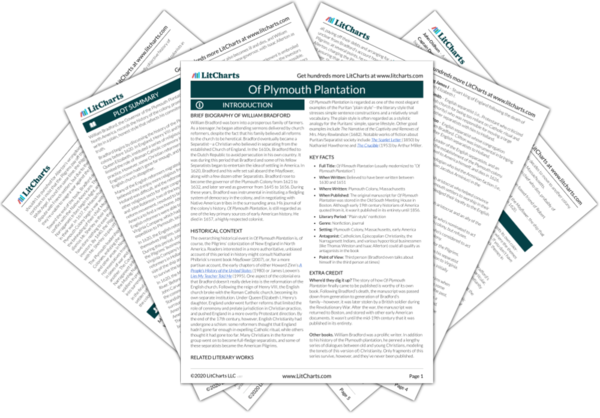Summary
Analysis
By July of 1620, the reformers have obtained the necessary materials for a voyage to America. They sail out of Delfthaven, sorry to leave Holland but faithful that God will protect them. Within a few days they’ve sailed to Southampton, England, where Carver and Cushman have found ships to take them to America.
Thanks to Weston, Carver, and Cushman, the Pilgrims are now sailing to New England under a new contract that requires them to pay more money upfront and pay the remainder back sooner.
Themes
Quiz
Test Yourself
In Southampton, the English reformers, now calling themselves Pilgrims, have to close their business with Cushman. Weston arrives to gives the Pilgrims provisions and help with clearing their financial obligations. But when the Pilgrims refuse to finalize their business arrangement with Weston, Weston becomes offended and leaves. As a result, The Pilgrims lack about one hundred pounds to clear their obligations, meaning that they’re forced to re-sell some of their provisions.
Bradford hereafter refers to the congregants as Pilgrims, rather than Puritans or Separatists. The concept of the pilgrimage is very important to Christianity, and the Plymouth Pilgrims took inspiration in the long tradition of Christian visionaries and prophets who made pilgrimages in search of religious enlightenment. Yet the passage also contrasts the high-mindedness of the Pilgrims’ concept of themselves with the harsh reality of their debts to Cushman. Yet as we will see, debt and financial responsibility becomes fundamentally linked to the Pilgrims’ religion: an impetus to work hard and be responsible for one’s own life.
Themes
Quiz
Test Yourself
In August of 1620, while still in Southampton, the Pilgrims pen a letter to the various merchants of the area, many of whom have purchased stock in the Virginia Company. In the letter, the Pilgrims stress that Cushman rewrote the contract with the Pilgrims to require them to pay more money. They also promise to reimburse the merchants investors over the next seven years, in the event that they haven’t already turned a profit.
The Pilgrims’ letter is intended to reassure the merchant investors (who’ve financed the voyage to America) that they’re reliable, trustworthy people who’ll pay back their debt. This is a wise move, since the investors will wield a lot of power over the Pilgrims in the years to come, so the Pilgrims need to stay in their good graces.
Themes
Quiz
Test Yourself
On July 27, 1620, John Robinson (an important leader of the English separatists) writes a letter to the Pilgrims in which he outlines five pieces of advice. First, he advises them to repent their sins. Second, he tells them to be reasonable and never to take offense at other people’s behavior. Third, he urges the Pilgrims to cooperate, recognizing that they’ll be working side by side in a strange place. Fourth, he advises them to work for a common good, rather than pursuing selfish interests. Finally, he stresses that the Pilgrims are about to become a “body politic,” meaning that they should elect an honest leader. The Pilgrims receives Robinson’s letter and, following his advice, elect governors and assistants for the voyage. Then, with their affairs settled, they sail for America on August 5th, in two separate ships.
Robinson’s letter stresses the Pilgrims’ religious faith, but it also addresses some more practical concerns. Robinson stresses the need for cooperation and condemns selfishness. However, as Bradford shows, the Pilgrim’s society is both selfish and cooperative—they (or at least their leaders) find that what’s best for the individual farmer is often best for the group. With the word “elect,” Robinson stresses the democratic nature of the plantation, but Bradford doesn’t give much information about how leaders were chosen at Plymouth, and historians debate how democratic the colony really was.
Themes
Literary Devices
Quiz
Test Yourself
Get the entire Of Plymouth Plantation LitChart as a printable PDF.













